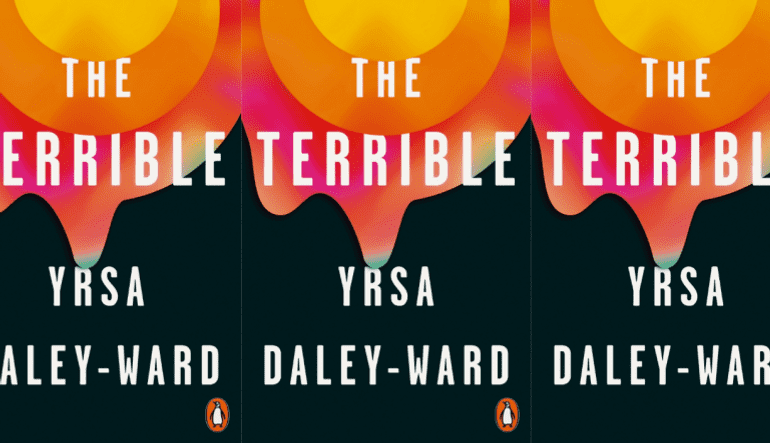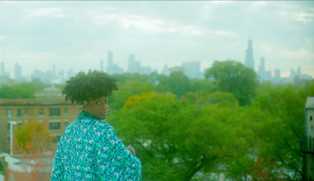A year on from the publication of the novel, our culture editor Nkenna Akunna speaks to Yrsa Daley-Ward about her work, her inspirations, and the power of naming our traumas and fears.
The Terrible is a form-defying memoir that maps the Yrsa Daley-Ward’s evolving relationship with her mind. The book follows a black British girl through to womanhood as she grapples with the narratives she’s inherited, what they conjure inside her, and the choices she makes to survive. Mixing poetry and prose, The Terrible illuminates the spaces within us, vestiges of trauma, generational and new, that are often ignored or silenced.
Nkenna Akunna: Firstly, thank you for giving us a model through which we, black women and femme-identifying people, can speak to and about murky parts of ourselves. Reading this book made me feel safer.
Yrsa Daley-Ward: Oh you’re so welcome. Thank you! That’s so kind.
NA: Your story involves a lot of movement; from Tralee to Manchester to London to Johannesburg, from Los Angeles to New York. The Terrible feels particularly resonant when thinking about histories of black migration and forced migration. How do you think your journeys have helped or hindered your understanding of yourself? Especially in this moment, when agency around movement is so heavily restricted?
YD: Travel can only help you. It can only make you richer and add to the layers through which you understand people, understand space, understand yourself. [Travel informs] how you act in different situations, how you adapt, how quickly you learn. Being able to travel has been super positive, and I feel incredibly lucky. I also think that moving around really early [in your life] demystifies the fear around it.
[Before leaving the UK], I had been feeling extremely depressed. I said to myself “I need to just change it up. I need to go somewhere different,” and so I moved to South Africa. And even though I didn’t have any real money, being able to make that decision was a privilege, in me managing to get the funds together for the airplane ticket over there, and then in me going straight to work at a model agency. I wasn’t working a lot, but I was able to tide myself over. I consider myself lucky because I am quite resourceful. You’ve read The Terrible, so it’s clear I’ve always had an edge that’s helped me in a lot of ways. But then I also know that many people feel they don’t have freedom and space and opportunity to move around like that. I’ve certainly felt that.

N: Do you feel like any of those spaces brought out something distinct in you?
YD: I learned what I could deal with. For example, in South Africa, I learned that I could live in a place where I didn’t speak the language that most people around me spoke. The majority of the people were Zulu or Xhosa or Afrikaans, and I quickly learned that that was fine. You learn what kind of things you can take to and what you can’t.
But then moving to LA, I missed my green spaces and missed being able to walk; that was difficult. It was beautiful, but just different. I did learn that I love hot weather all year round. Well I already knew that, but yeah.
From New York, I learned that I am city oriented. I’d like to live in a quiet place in the city, but I love the city.
NA: In the book you talk about your biological father, the Amazing Nigerian, and even though African-ness is part of your ethnicity and heritage it was something that always felt, understandably, very distant. Did living on the continent affect how you thought about yourself and your own ethnicity?
YD: I’ve always been solid in that anyway. I don’t know my Nigerian family yet and I haven’t met them in the flesh, but I have a good friendship group that are Nigerian so I’ve always felt rooted in that culture. I seeked it out, you know, I didn’t grow up with it so I went to London and Manchester when I got older. I knew I wanted that, I wanted to see that. Spending some time in South Africa and Senegal, I can say that yeah, there’s a different feeling. There’s a feeling when your feet touch that ground.
NA: Yes. I went back to Nigeria for the first time in 20 years last year, and experienced a different kind of serenity. Like my soul and my skin were in a different kind of alignment. It was really beautiful.
With that idea of the body in space in mind, I want to talk about the title of the book. The Terrible feels like this multi-sourced balled up thing, like something that is a part of you but also third person. It feels like an inheritance that is not just familial but also social, historical, a result of the effects of living in a space, or being thrown into a space that wasn’t necessarily built for you, or that is a rigid world that you have to find your way through. Can you speak to me a bit about this conception of The Terrible? Not necessarily to tell me exactly what it means, but where the title came from, and how you expanded from it to create a whole memoir with that as the crux.
YD: The Terrible is a different thing for everybody. It is a shape-shifting thing, it can be whatever the thing is in you that trips you up again and again and again. It’s the thing we try to run away from and, most basically, the thing that we find difficult. It’s the thing that’s in the way: grief, loneliness, despair, addiction. So, when I thought about the fact that it can be a mixture of a lot of things, [it became clear that] it is like a little monster, or a person who keeps following you around. And what you actually want to do, instead of running from it and denying it, is to make peace with it.
N: Wow, yes.
Y: So then I thought of it as an entity that is separate from you that is also of you, sometimes to sit with and have dinner with. Sometimes it is banging on your bedroom door, sometimes it sleeps with you at night, sometimes it disappears for a little bit. But [what I wanted to get at is] this idea that there’s no shadow part of you that can’t be harnessed and used for, you know, your own betterment. That’s the theory.
N: There’s just so much in that, and thinking back to the experience of reading the book, those ideas were visually apparent in many ways also. The way the words are laid out on the page, how chapters and themes are visually represented… there’s this title that people have given you of ‘instapoet,’ which I think speaks to your ability to aesthetically curate a feeling as well as intellectually.
Y: Those decisions weren’t really conscious. I just had a feeling ‘this needs to be justified to the left, this needs to be aligned like this, X has just happened so I need a moment so let’s leave some white space there…’ In that way it is just really all intuitive.
N: The book melds various literary forms in a way that, quite beautifully, seems to reject strict order or boundaries. Was there intentionality behind that?
Y: I actually expected the whole book to be straight narrative when I started it, but when it started arranging itself differently on the page I just didn’t stop it. My key thing is, and if anyone comes to me and asks me about writing, I always tell them to just let it flow out in whatever form it’s going to take and don’t try and shape it too much, because sometimes trusting that part of you that is a bit more autopilot is akin to trust in your intuition. Your intuition knows how to write it.
I don’t know if I would want to read something that was just in one form. Some of the things that I do, you couldn’t do that all the way through the book because it would just be tampering. It’s definitely not super conscious; I don’t really write like that. First of all, because I don’t enjoy that and secondly ,because you come into it at different times. You have different moods. I might have just seen a film or listened to music that inspires me arrange the sentences in a different way.
N: It’s also something to be said about how you experience life. You’re not thinking about things in one particular way all the time. You just let them come.
Y: Absolutely.
N: So I know that you’re not writing with a particular idea of how this thing needs to be read or received, but did you at any point in the process of the book have an idea or thought about who your audience would be, or who you wanted your audience to be?
Y: There are many times in my life where if there had been a book that talked about things that I wasn’t sure we could talk about, it would’ve saved me from feeling the way that I did a lot of the time, which [is to say] not great. So I’m writing to those people, people who are really living in those circumstances. We’re all connected, so I guess I write with that intention for the words to act as a bridge. So people don’t feel so isolated in what is happening to them.
N: That goes back to the idea of The Terrible being whatever it is to each person. The ways you would describe The Terrible felt so visceral, as if I was there in the room. We don’t have similar experiences at all but it still felt like you were talking about some of the things that I have felt. I think when one’s work resonates like that, particularly in specific communities, you can become a bit of a figurehead. I know your last book, Bone, gave you such status within the LGBTQ community. Was there any sense of trying to create a title for yourself with this book, not necessarily one appointed to you?
Y: I have had so many titles assigned to me that are just… interesting [laughter]. You just can’t escape it. When you put a book out, particularly a memoir, I think consciously or unconsciously you do re-define who you are. But then people take things from that are just not completely accurate. So you are never going to win like that and you have to not care. Or be consistently correcting people. I am also changing constantly, there are things that I assign to myself and things that I don’t and they may change and they may stay the same but it is just very interesting what… I read things about myself all the time and it’s just like ‘oh is that so?’ [Laughter]
N: We are always changing. There are always going to be vestiges of older selves but the story is not done.
Y: Not at all, not at all.



%20Joshua%20Virasami.jpg)
